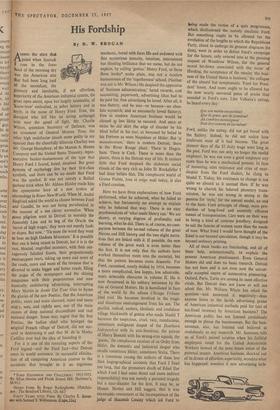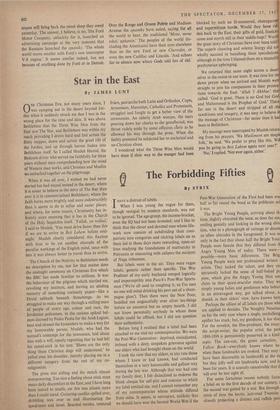His Fordship
By D. W. BROGAN A MONO the stars that 4n, paled when Sputnik rose in the fore- head of the morning sky Was the American star that had been long lord of the ascendant, the primacy and inevitable, if not effortless, superiority of the American industrial system, the great open secret, open but largely inimitable, of `know-how' embodied, in sober history and in Myth, in the name of Henry Ford. True, the demigod who fell like an erring archangel with near the speed of light, Mr. Charlie Wilson, quondam Secretary of Defence, was an ornament of General Motors. True, the other high malefactor (much more guilty in my opinion than the cheerfully illiterate Charlie) was Mr. George Humphrey, of the Marcus A. Hanna Company and the United States Treasury, repre- sentative banker-businessman of the type that Henry Ford I feared, hated, despised. But great Systems of mythology live by their first-class symbols, and there can be no doubt that Ford was the symbol. It was not merely a Balliol parlour-trick when Mr. Aldous Huxley made him the eponymous hero of a new system of chronology in Brave NeurWorld. When M. Andr5 Siegfried asked the world to choose between Ford and Gandhi, he was not being paradoxical in the manner of a too clever normalien. When pious pilgrims went to Detroit to worship the Assembly Line and to beg of the Oracle the 'secret of high wages,' they were not merely fools or dupes. But now, "Tis mute the word they went to hear on high Dodona Mountain.' It is possible that one is being unjust to Detroit, but it is in the vast, bloated, ungirdled monsters, with their out- rageously falsified fronts, their preposterously steatopygous rears, taking up more and more of the roads, more and more of the revenue that is diverted to make bigger and better roads, filling the pages of the newspapers and the shining magazines with their preposterous and now ironically embittering advertising, interrupting Mary Martin in Annie Get Your Gun to hymn the glories of the new Pontiac, that the American public, more and more alarmed, more and more angry, sees, and rightly sees, one of the main causes of deep national discomfiture and real national danger. Some may regret that the first Pontiac, the Indian chief who besieged the original French village of Detroit, did not suc- ceed in destroying it and that M. de la Mothe Cadillac ever had the idea of founding it.
For it is one of the revealing aspects of the Ford legend—and the Ford fact—that Detroit owes its world eminence, its successful elimina- tion of all competing American centres to the accidents that brought to it an ingenious * FORD EXPANSION AND CHALLENGE 1915-1933. By Allan Nevins and Frank Ernest Hill. (Scribner's, $8.95.) HENRY FORD. By Roger Burlinghamc. (Hutchin- son: The Stratford Library, 12s. 6d.) FORTY YEARS WITH FORD. By Charles E. Soren- sen with Samuel T. Williamson. (Cape, 21s.) mechanic, bored with farm life and endowed with that mysterious tenacity, intuition, intermittent but blinding brilliance that we name, but do not explain, by calling 'genius.' Henry Ford, as these three books* make plain, was not a modern businessman of the 'togetherness' school. (Neither was nor is Mr. Wilson.) He despised the apparatus of 'business administration,' hated records, cost accounting, paperwork, advertising (that had to be paid for, free advertising he loved. After all, it was flattery, and he was—or became—an abso- lute monarch, and so necessarily loved flattery). Few in modern American business would be classed as less likely to succeed. And once or twice he did skirt the edge of disaster by his blind belief in his star, as bemused by belief in his Fortune as were Napoleon or Hitler. But `si monumentum,' there is modern Detroit, there is the River Rouge plant. There is Dagen- ham. There is Cork. There is more than the plants; there is the Detroit way of life. It matters little that Ford despised the elaborate social rituals of the very rich as John D. Rockefeller I had done before him. The complacent world of Grosse Pointe, Ions at origo mall today, is also a Ford creation.
Here we have three explanations of how Ford performed, what he achieved, what he failed to achieve, but fortunately no attempt to explain why he behaved that way. There is no easy psychoanalysis of 'what made Henry run.' We are shown, at varying degrees of profundity and learning, what he did. There is, of course, no com- parison between the second volume of the great Nevins and Hill history and the two slight narra- tives that are linked with it. If possible, the new volume of the great work is even better than the first. It is not only that the authors have worked themselves more into the material, but that the pattern becomes more dramatic. For Ford, canonised, nearly deified by 1914, becomes a more complicated, less happy, less admirable, more debatable character in volume II. He is now threatened in his solitary eminence by the rise of General Motors. He is humiliated in face of the world by the odious Chicago Tribune libel trial. He becomes involved in the tragic and disastrous enstrangement from his son. The pacifist, radical, austere, idealistic and credulous village blacksmith of genius who made Model T becomes the suspicious, cruel, vain, mendacious, sometimes malignant despot of the Dearborn Independent with its anti-Semitism, the patron of Harry Bennett with his strong-arm squads, the `goons,' the complacent receiver of an Order from Hitler, the domestic and industrial despot who recalls sometimes Hitler, sometimes Stalin. There is a consensus among the authors of these less than hagiographical accounts that Ford I lived too long, that the premature death of Edsel (for which Ford I had some direct and more indirect responsibility) was not merely a personal tragedy but a near-disaster for the firm. It may be, as Messrs. Nevins and Hill suggest, that it was reasonable resentment at the incompetence of the judge of Macomb County which led Ford to being made the victim of a quiz programme, which disillusioned the naively idealistic Ford. But something ought to be allowed for the revelation of the lengths to which the Republican Party, about to undergo its greatest disgraces (to date), went in order to defeat Ford's campaign for the Senate, only entered into at the pressing request of Woodrow Wilson, for the general' moral let-down associated with the name of Harding, the acceptance of the maxim 'the busi- ness of the United States is business,' the collapse of the absurd but symptomatic 'Ford for Presi- dent' boom. And more ought to be allowed for the now nearly universal pman of praise that sounded in Ford's ears. Like Voltaire's satrap, he heard every day :
Que son merite est extreme! Que de grace, que de grandeur! A h combien monseigneur Doh etre content de lui-meme!
Ford, unlike the satrap, did not get bored with the flattery. Indeed, he did not notice how irrelevant most of it had become. The great pioneer days of the $5 daily wage were long in the past. Ford was not only no longer the model employer, he was not even a good employer any more than he was a mechanical pioneer. In face of mounting sales resistance and cries of near- despair from the Ford dealers, he clung to Model T. Today, his resistance to change is not quite so absurd as it seemed then. If he was wrong to cherish his beloved planetary trans- mission, he was not wrong in seeing in the passion for 'style,' for the annual model, an end to the basic Ford principle of cheap, mass pro- duction of long-lived and austerely efficient means of transportation. Cars were on their way to being a kind of costume jewellery, designed to suit the fancies of women more than the needs of men. What Ford I would have thought of the Edsel is not beyond speculation, though it may be beyond ordinary printing.
All of these books are fascinating, and all of them help, unintentionally, to explain the present American predicament. Even General Motors did and does no basic research. Detroit has not been and is not even now the univer- sally accepted centre of automotive pioneering. Oxford, Paris, Turin are among its most effective rivals. .But Detroit does not know or will not admit this. Mr. William Whyte has asked the question—and answered it negatively—does anyone listen to the lavish advertising praise of American industrial methods paid for (out of tax-freed revenue) by American business? The American public has not listened credulously enough to please the businessman. But the busi- nessman, alas, has listened and believed as credulously as any monarch. Mr. Sorensen tells us of Ford's pained surprise when his faithful employees voted for the United Automobile Workers instead of the tame house union of the paternal master. American business, shocked out of its dream of effortless superiority, wonders what has happened, wonders if new advertising tech- niques will bring back the sweet sleep they owed yesterday. The answer, I believe, is no. The Ford Motor Company, unluckily for it, launched an advertising campaign at the very moment that the Russians launched the sputniks. 'The whole world seems smaller with Ford's new interceptor V-8 engine.' It seems smaller indeed, but not because of anything done by Ford or in Detroit. Over the Rouge and Grosse Pointe and Madison Avenue the sputniks have sailed, saying for all the world to hear, the traditional Ilene, mene tekel, upharsin.' The peoples of the world (in- cluding the Americans) have their eyes elsewhere than on the new Ford or new Chevrolet, or even the new Cadillac and Lincoln. 'And echoes list to silence now where Gods told lies of old.'



























 Previous page
Previous page